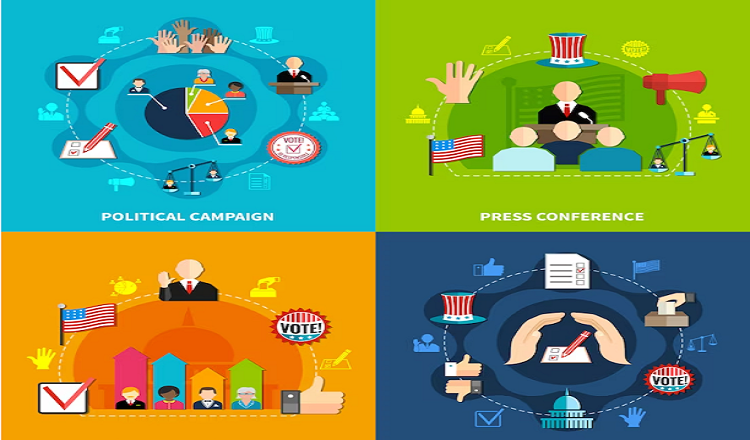American democracy is based on political campaigns, which bring with them the pervasive presence of campaign advertising. But have you ever paused to think about the morality of these advertisements? The issue of moral campaign advertising is more crucial than ever in the modern world, where political polarisation is at an all-time high and deception is rife.
What precisely does political campaign advertising consist of? In its most basic form, it is the employment of numerous media outlets throughout an election cycle to support a candidate, party, or particular topic. But it involves more than just spreading the news. These advertisements have the power to alter voter behaviour, public perception, and even election outcomes. Because of this, it’s crucial to guarantee that political campaign advertising is carried out in accordance with the highest ethical standards.
We’ll examine the many ad formats utilised by campaigns, from conventional television commercials to social media posts, as we delve into the morality of political campaign advertising. We’ll also talk about the value of ethics in political advertising and the necessity of openness, truthfulness, and justice. Before we get any further, though, let’s quickly review the development of political campaign advertising in the United States to the monster it is today.
Political campaign advertising types
With the development of technology, there are now more ways than ever to contact voters with political campaign advertising. Television, radio, and print commercials are the conventional modes of political advertising. Campaign consultants frequently create these kinds of advertisements, which are then broadcast on national networks, regional stations, and newspapers. Political campaigns started using digital media to reach voters after the internet was invented, such as internet adverts and email campaigns. In recent years, social media advertising has also become a potent tool, with campaigns employing sites like Facebook and Twitter to target particular demographics and disseminate their message. Each form of advertising has benefits and drawbacks, and campaigns must employ a variety of these platforms to effectively reach voters.
Political campaign advertising and morality
The integrity of the democratic process depends on political campaign advertising adhering to ethical standards. Campaigns must preserve honesty and truthfulness, refraining from making false or misleading claims in their advertisements. Campaigns should be clear about who is supporting their advertising and the messaging behind them, as transparency and disclosure are also very important. Fairness and impartiality demand that campaigns refrain from disparaging their opponents or unjustly targeting particular groups. Respecting opposing viewpoints and the people who embrace them promotes civil debate and a robust democracy. Last but not least, compliance with laws and regulations is crucial, and campaigns must make sure they conform to all legal obligations, including donation caps and transparency standards. Assuring that voters can make decisions based on accurate, impartial, and transparent information is essential to maintaining the integrity of the political process.
Political campaign advertising that is ethical and unethical, with examples
To demonstrate the difference between ethical and immoral advertising, case studies of political advertisements might be examined. Political advertisements that accurately portray a candidate’s platform, contain factual information, and refrain from unfairly disparaging rivals are examples of those that adhered to ethical norms. Case studies of unethical political advertisements, on the other hand, include those that employ false information, revert to personal assaults, or play on voters’ fears and biases. Job displacement, privacy concerns, and the risk of AI being exploited maliciously are some ethical issues that have recently come to light. By examining these case studies, campaigns and voters can both learn how crucial it is to uphold moral norms in political advertising.
Negative Publicity
Political campaign advertising that attacks rivals or their positions is known as negative advertising. It can take many different forms, such as criticising an opponent’s skill or character, drawing attention to their flaws or shortcomings, or portraying them negatively. In recent years, negative advertising has proliferated, yet it creates ethical questions. Critics contend that it deters voters, erodes faith in the democratic system, and adds to a toxic political environment. Voters are susceptible to the effects of negative advertising in a variety of ways, depending on the nature of the assaults, the reliability of the sources, and the voter’s pre-existing attitudes. Maintaining the integrity of the political system and making sure that voters have access to accurate and honest information depend on examining the moral implications of negative advertising.
The Media’s Role in Political Campaign Advocacy
The media is a key component of political campaign advertising since it acts as a channel for messages to reach voters. However, this position entails a duty to report on political advertising truthfully and impartially. Fact-checking political advertisements to make sure they contain accurate and truthful information is part of the media’s obligation. Studies indicate that the media may have a substantial impact on how voters view political advertisements and how they view candidates and their agendas. In order to promote openness and guarantee that voters have access to accurate information, the media’s role in political campaign advertising is crucial. The media can contribute to preserving the integrity of the democratic process by upholding its moral standards and fact-checking political advertisements.
Conclusion
In conclusion, upholding moral norms in political advertising is crucial to protecting the legitimacy of the democratic system. Important characteristics that campaigns must uphold in their advertisements are honesty, transparency, fairness, respect, and conformity to rules and regulations. With examples of campaigns that have crossed ethical lines, there have recently been questions raised regarding the morality of political advertising. This demonstrates the necessity for stricter laws to guarantee that advertising campaigns follow moral standards. Stricter rules can aid in promoting openness, truthfulness, and justice in political advertising and eventually aid voters in making educated judgements. Political campaign advertising’s moral obligations
American democracy is based on political campaigns, which bring with them the pervasive presence of campaign advertising. But have you ever paused to think about the morality of these advertisements? The issue of moral campaign advertising is more crucial than ever in the modern world, where political polarisation is at an all-time high and deception is rife.
What precisely does political campaign advertising consist of? In its most basic form, it is the employment of numerous media outlets throughout an election cycle to support a candidate, party, or particular topic. But it involves more than just spreading the news. These advertisements have the power to alter voter behaviour, public perception, and even election outcomes. Because of this, it’s crucial to guarantee that political campaign advertising is carried out in accordance with the highest ethical standards.
We’ll examine the many ad formats utilised by campaigns, from conventional television commercials to social media posts, as we delve into the morality of political campaign advertising. We’ll also talk about the value of ethics in political advertising and the necessity of openness, truthfulness, and justice. Before we get any further, though, let’s quickly review the development of political campaign advertising in the United States to the monster it is today.
Political campaign advertising types
With the development of technology, there are now more ways than ever to contact voters with political campaign advertising. Television, radio, and print commercials are the conventional modes of political advertising. Campaign consultants frequently create these kinds of advertisements, which are then broadcast on national networks, regional stations, and newspapers. Political campaigns started using digital media to reach voters after the internet was invented, such as internet adverts and email campaigns. In recent years, social media advertising has also become a potent tool, with campaigns employing sites like Facebook and Twitter to target particular demographics and disseminate their message. Each form of advertising has benefits and drawbacks, and campaigns must employ a variety of these platforms to effectively reach voters.
Political campaign advertising and morality
The integrity of the democratic process depends on political campaign advertising adhering to ethical standards. Campaigns must preserve honesty and truthfulness, refraining from making false or misleading claims in their advertisements. Campaigns should be clear about who is supporting their advertising and the messaging behind them, as transparency and disclosure are also very important. Fairness and impartiality demand that campaigns refrain from disparaging their opponents or unjustly targeting particular groups. Respecting opposing viewpoints and the people who embrace them promotes civil debate and a robust democracy. Last but not least, compliance with laws and regulations is crucial, and campaigns must make sure they conform to all legal obligations, including donation caps and transparency standards. Assuring that voters can make decisions based on accurate, impartial, and transparent information is essential to maintaining the integrity of the political process.
Political campaign advertising that is ethical and unethical, with examples
To demonstrate the difference between ethical and immoral advertising, case studies of political advertisements might be examined. Political advertisements that accurately portray a candidate’s platform, contain factual information, and refrain from unfairly disparaging rivals are examples of those that adhered to ethical norms. Case studies of unethical political advertisements, on the other hand, include those that employ false information, revert to personal assaults, or play on voters’ fears and biases. Job displacement, privacy concerns, and the risk of AI being exploited maliciously are some ethical issues that have recently come to light. By examining these case studies, campaigns and voters can both learn how crucial it is to uphold moral norms in political advertising.
Negative Publicity
Political campaign advertising that attacks rivals or their positions is known as negative advertising. It can take many different forms, such as criticising an opponent’s skill or character, drawing attention to their flaws or shortcomings, or portraying them negatively. In recent years, negative advertising has proliferated, yet it creates ethical questions. Critics contend that it deters voters, erodes faith in the democratic system, and adds to a toxic political environment. Voters are susceptible to the effects of negative advertising in a variety of ways, depending on the nature of the assaults, the reliability of the sources, and the voter’s pre-existing attitudes. Maintaining the integrity of the political system and making sure that voters have access to accurate and honest information depend on examining the moral implications of negative advertising.
The Media’s Role in Political Campaign Advocacy
The media is a key component of political campaign advertising since it acts as a channel for messages to reach voters. However, this position entails a duty to report on political advertising truthfully and impartially. Fact-checking political advertisements to make sure they contain accurate and truthful information is part of the media’s obligation. Studies indicate that the media may have a substantial impact on how voters view political advertisements and how they view candidates and their agendas. In order to promote openness and guarantee that voters have access to accurate information, the media’s role in political campaign advertising is crucial. The media can contribute to preserving the integrity of the democratic process by upholding its moral standards and fact-checking political advertisements.
Conclusion
In conclusion, upholding moral norms in political advertising is crucial to protecting the legitimacy of the democratic system. Important characteristics that campaigns must uphold in their advertisements are honesty, transparency, fairness, respect, and conformity to rules and regulations. With examples of campaigns that have crossed ethical lines, there have recently been questions raised regarding the morality of political advertising. This demonstrates the necessity for stricter laws to guarantee that advertising campaigns follow moral standards. Stricter rules can aid in promoting openness, truthfulness, and justice in political advertising and eventually aid voters in making educated judgements.
As political campaign advertising develops, it becomes increasingly important to address new ethical issues including privacy, employment displacement, and the possibility for AI to be misused for bad. Ensure that political campaigns adhere to ethical norms going ahead by taking into account how voters and society as a whole are affected by political advertising. By doing this, we can contribute to the development of a robust democracy and make sure that the political system continues to be fair, open, and reliable.
As political campaign advertising develops, it becomes increasingly important to address new ethical issues including privacy, employment displacement, and the possibility for AI to be misused for bad. Ensure that political campaigns adhere to ethical norms going ahead by taking into account how voters and society as a whole are affected by political advertising. By doing this, we can contribute to the development of a robust democracy and make sure that the political system continues to be fair, open, and reliable.
Read More You May Like:











